Composer Arne Nordheim
A Conversation with Bruce Duffie
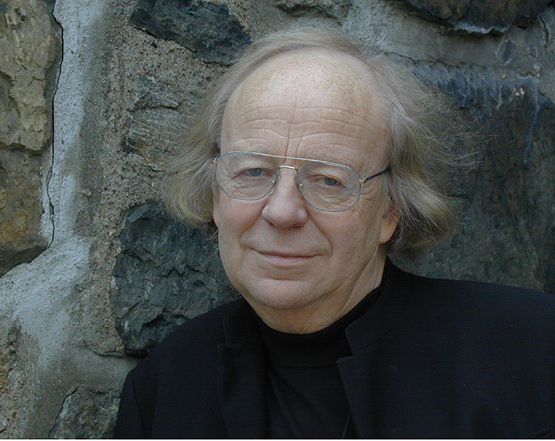
Composer Arne Nordheim
A Conversation with Bruce Duffie

Even in the 1960s and 70s, Arne Nordheim was known around the world as the major figure in Norwegian music. In the early 80s, when I first began to seriously program new music on WNIB, I concentrated mostly on American composers and just a few of the Europeans. It soon settled into a pattern of full programs with the interviews I was gathering, plus scattered pieces by others who were important. Rarely did I have the time to present a full program of material by a single composer with whom I'd not had a chat, but Arne Nordheim was one whose music needed to be part of the series. So on my master list, the date {6/22/91} is in those funny brackets which indicate a full show of music without interview to celebrate his 60th birthday.
Right then and there, I knew that for his 65th birthday I would try to obtain an interview to include with that program, and I was fortunate that it did happen. Even though his schedule wasn't bringing him to Chicago and my travels didn't take me to Norway, we arranged to speak on the phone, and, as usual, the sound was quite good - just like he was talking to me from next door.
When I first contacted him about doing an interview, he was curious
about how it would work, and I assured him it would be quite good for our
listeners. Naturally, he was always busy, but agreed to make a bit
of time for the conversation as long as it fit nicely into his daily routine.
Since my regular schedule for being awake was evening/overnight, I called
him at 4:30 AM in Chicago, which was conveniently mid-morning for him in
Norway. After exchanging pleasantries he noted that we were speaking
via satellite. Here is most of our conversation . . . . .
Bruce Duffie: You have been called "the reformer of Norwegian music." Is this a title that you like?
Arne Nordheim: You know, it is a title that is given to me by someone else. I've nothing against it, really. I don't mind. It's okay. I don't know if it's right, but still, it's there.
BD: Did you set out to change Norwegian music?
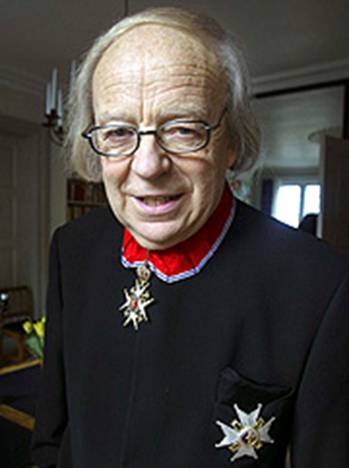 AN:
[Emphatically] No, never! I just had to write down the music
I like very much. I don't write the music I don't like, so that's
how it all goes. I am mainly occupied with writing my own music.
AN:
[Emphatically] No, never! I just had to write down the music
I like very much. I don't write the music I don't like, so that's
how it all goes. I am mainly occupied with writing my own music.
BD: Do you like music that you hear from other Norwegian composers?
AN: [Thinks for a moment, then answers, ambivalently] Yes, both. I like it and I dislike it. It's like anything else in the world. A lot of things I like very much and a lot of things I dislike, so this is rather an invaluable statement.
BD: Right. Well, how do audiences relate to your music? Do you find that they react warmly?
AN: [Thinks for a moment] You know, in the beginning they did not, but now [chuckles] after having been working for more than 30 years in composing, it comes out that they walk up to me and say, "Gee, you have changed." And I say, "It might be that you have changed." There has been development. New music today is not the same as new music 30 years ago. Today, new music is more common. It's everywhere. It's in the television, it's in radio, it's in the films, movies... everywhere. So people are getting used to it. Years ago, they were not used to it.
BD: I understand that the people who listen to you change, of course. I also assume that your music has changed somewhat over the years.
AN: [Thinks for a moment] Mm-hmm. Probably the pure experimenting is left behind more or less; probably more and more than less, and I'm writing more surely now. I'm still very curious, but I have so much good experience from my previous years of experimenting. Now I can see that I am paid back from this and I can easily move around. So I don't pour out so many experimental things as I did before. That's probably the biggest change.
BD: I assume, though, that you do not disown your earlier works.
AN: [Fervently] No! No, I like them very much. I have, for instance, a piece called Response, which is a large piece which consists of a whole family of pieces. Up to now it's four different pieces, various instrumental groups against electronically treated sounds from the same kind of instruments as played live onstage. This piece is played very much, and it's so different from time to time. It is the same because it stays in the frame of the electronic elements, but it's changing. The latest version is for four groups of percussion players, organ, and electronic tape.
BD: Do you make the changes yourself to have different players surround the tape?
AN: Yes, I do! So that is a piece which I've been working on since 1967. It's there; it's still full of life. It's wonderful, I think. It's with me.
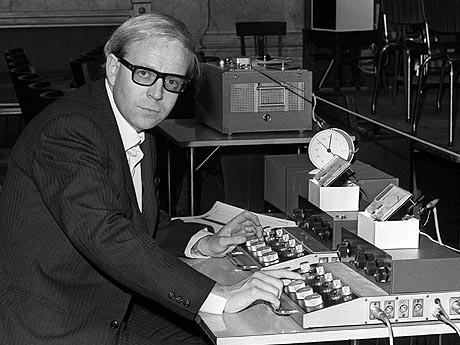
BD: But the tape is always the same.
AN: The tape is always the same, but the relation between the tapes and the instruments are different from time to time. And that changes the whole piece, of course, because the tape running all the time is the same from piece to piece! Then the instruments come in and make interferences with the tape, so each time the interferences are different. That makes a kind of continuous birth, in a way, and I like that. [Chuckles]
BD: Do you view each of your pieces as an offspring? Do you give birth to each new piece like a child?
AN: [Thinks for a moment, then says, enthusiastically] Oh, yes, yes, offspring, yes. Very much so. It goes for a very long time, you know, a kind of pregnancy, and then it comes as babies do, you know, quickly. And with a scream.
* * * * *
BD: When you're working on the piece and you're tinkering with it, how do you know when you should launch it on the world? How do you know when it's finished?
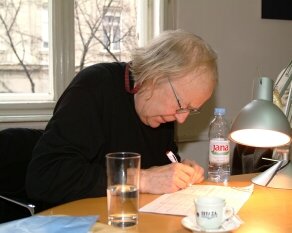 AN:
[Thoughtfully] Oh, that's a very good question, because this morning
I discovered something in a piece I had written for violin and viola, a
duo, called Duplex. It is quite new--I was going to mail it
this morning, and I said, "No. Stop. You know, there in bars
110 to 119 there is something wrong." So if I had sent it away, it
would have been performed like that. But now I haven't sent it yet!
I am going to mail it after this conversation and it will be with the new
part which is so much better! So really the piece is not finished.
I think that you can sit in a concert hall, especially during rehearsals,
and hear parts, or bits and pieces of the music that you would like to
make differently. But then, you must say, [sternly] "Stop."
Then it is, so to speak, finished. When the piece is printed, you
know it's finished.
AN:
[Thoughtfully] Oh, that's a very good question, because this morning
I discovered something in a piece I had written for violin and viola, a
duo, called Duplex. It is quite new--I was going to mail it
this morning, and I said, "No. Stop. You know, there in bars
110 to 119 there is something wrong." So if I had sent it away, it
would have been performed like that. But now I haven't sent it yet!
I am going to mail it after this conversation and it will be with the new
part which is so much better! So really the piece is not finished.
I think that you can sit in a concert hall, especially during rehearsals,
and hear parts, or bits and pieces of the music that you would like to
make differently. But then, you must say, [sternly] "Stop."
Then it is, so to speak, finished. When the piece is printed, you
know it's finished.
BD: You never revise, even after publication?
AN: Yes, I do! I do, but I have agreed with my publisher I shouldn't do that so much because then they have to reprint the scores, and that's terribly costly. So it's a kind of censure through the economical way. But even so, I see the first performance, or the first performances of a piece as a state of composing. It's still composing then. You can still compose, as long as my relation to the publishers is good. We agree that after the printing, no further. Of course, it's possible, but, you know...
BD: You try to avoid that.
AN: I try to avoid that, yes. But I would say the first performances and the American premiere could be different.
BD: When you're working on a piece, do you have the audience in mind?
AN: No, I don't, because I think as the composer, I have to be the first listener. I'm making the choices, so I have to sit down and like or dislike that music I write. I take away the things I dislike and I keep the things I like. It's as simple as that. So I am the first listener. I am the creator and the first listener; it's two persons in one! I know that so many people are like me. That's why I have to be honest to myself and just take the things that I do appreciate most, or even love, because I am a stand-in for the audience in this process. At the same time I'm writing for myself and I am writing for the audience.
BD: This is what I'm getting at. You write for yourself, and for the audience, but you say the audience doesn't cross your mind at all?
AN: Well, yes! I like to think of hundreds and thousands of people sitting there listening to my music. I like to think of it in that way, but they are never present at my desk while writing. Never.
BD: Is the music that you write for everyone?
AN: Yes. [Pauses for a moment] Music for everyone. I was once asked by someone who wanted to commission me for a piece for children. I said, "All my music is for children."
BD: The commissioner wanted you to tailor it a little simpler?
AN: I think so, yes. Although I think that children are very good listeners! And they respond very honestly with anger or with satisfaction or smiles or laughing and things like that, which is, of course, forbidden in the concert hall!
BD: Should it be?
AN: No! You could laugh; why shouldn't you? [Both chuckle] While you're being surprised, for instance, listening to the Fourth Symphony by Shostakovich. It's his self-portrait. Yeah, you have to laugh; you know, you must laugh because it's so funny and so grotesque and so poetic and so catastrophic--all at the same time. There are such strong moods in that piece. I've been in the concert hall where people really laughed in this piece. Of course, you can laugh for different reasons, but that's okay because that's part of the interpretation. We will always hear different things in music. Even in my own pieces, you will hear something which is not known to me! That is what makes it very interesting and very fascinating.
BD: We're kind of dancing around it so let me ask the question straight out: what is the purpose of music?
AN: What is the purpose of music? [Considers the question for a moment] Well, it's really difficult. You just pour out a question, and you pour out one of the most difficult ones on a satellite line to Norway. Okay, I'll try to answer. I think to compose music is a kind of process where you recall forgotten experiences and probably evoke forgotten images. [Pauses for a moment, and takes a deep breath] And I think also it is also to identify, or even to remember melodies, rhythms, and sounds that you have never experienced, in a way. Composing is a very funny situation. These things together make music, make composing. And, of course, the difficult thing is to write it down in signs and symbols so it can be understood by many people. The musicians need to have these symbols, and we have a long experience with symbols and signs, so we have no problems in communicating with musicians because they know how to read the music so it produces the sound that I want, in the way I want in the time and with the timbre I want; the melodies and rhythm and all that. [Takes a deep breath] But after that, it is a long way to go for music because the music starts, really, when it takes off from the instruments. It goes into people's minds and is wandering around there, seeking to identify what I call the "forgotten experiences" from long, long back. It's a kind of an atavistic memory you have from long, long, long back. Not you, yourself, but your predecessors, your families from ages back. I think that's what you are seeking. The composers must seek for the truth of these sounds which he has never heard, but will recognize at once when he sees them on the paper. I think that's composing. To control this most difficult situation--that's composing.
BD: How much control do you wish to exert? Do you wish every performance to be exactly the same as the other?
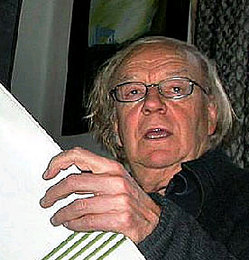 AN:
[With certitude] No. No. Of course not; I will not.
But I can't do that because that's impossible. There are so many
parameters. One individual in Norway--me--sitting here, and you playing
something in Chicago. I'm not there, so it will be quite different.
But if I'm there, I will stress my opinion on how it should be! So
sometimes it's better for me not to be there. [Both chuckle]
And not just for the composer but for the audience that you should get
something quite new, or for the musician who gets something quite new out
of it.
AN:
[With certitude] No. No. Of course not; I will not.
But I can't do that because that's impossible. There are so many
parameters. One individual in Norway--me--sitting here, and you playing
something in Chicago. I'm not there, so it will be quite different.
But if I'm there, I will stress my opinion on how it should be! So
sometimes it's better for me not to be there. [Both chuckle]
And not just for the composer but for the audience that you should get
something quite new, or for the musician who gets something quite new out
of it.
BD: So there is no one way it should be.
AN: No, there's not one way it should be, of course, but certain things, like speed, you must control. Otherwise, the melodic development will be meaningless. If you are playing it at half-speed, for instance, it's senseless. But then you have the metronome, which is a wonderful. I think it's the most useful instrument. And you have the pitch control you can make through the various instruments. I myself use the piano, now and then, just to not get lost in the process. I need to reconfirm, in a way, the status of where I am.
BD: And you put them all together and you get the piece of music.
AN: Yes. Yes, oh, yes. But the performances must be more or less alike. If you play the Fifth Symphony of Beethoven at half speed, that will kill the performance. How meaningless it would be. Nobody is playing it half speed these days. They might have done it once much slower than we do now.
BD: There still is quite a variation in tempo.
AN: Surely. You can listen to all the beautiful CDs and you can find they're all different in some way. That's the way music is behaving!
* * * * *
BD: Many of your works have been recorded. Is this a good thing or a bad thing for future generations who would try to find different things in your scores?
AN: Most of the recordings I have been present, so those performances, or those recordings, are more or less authorized performances. So that's the way I wanted it.
BD: But will this not hinder someone 50 or 100 or 200 years from now, from experimenting with your works?
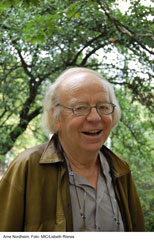 AN:
Well, to start with, I don't care so much what will hinder people 200 years
from now. I'm very much concerned with what's hindering people today
for playing this music. So I would say no. This is a model
which can be different. Look into the music and you will find something
quite new, something in the written scores which could be done differently.
I'm quite sure, for instance, that in the recording you received of the
cello concerto Tenebrae [with Truls Mork], you will find that the
opening sequence, which is a recitative, could be more recitativo.
You know, it could be more like narration, more like speaking. But
it's a wonderful performance of it, so it's right. In my opinion
this is right. But I can assure you that I heard another soloist
play this much more like a recitativo in the style of the early operas,
or even the Passions by Bach. But still, it is more musical,
more melodic, the way he is playing it on the recording you have.
AN:
Well, to start with, I don't care so much what will hinder people 200 years
from now. I'm very much concerned with what's hindering people today
for playing this music. So I would say no. This is a model
which can be different. Look into the music and you will find something
quite new, something in the written scores which could be done differently.
I'm quite sure, for instance, that in the recording you received of the
cello concerto Tenebrae [with Truls Mork], you will find that the
opening sequence, which is a recitative, could be more recitativo.
You know, it could be more like narration, more like speaking. But
it's a wonderful performance of it, so it's right. In my opinion
this is right. But I can assure you that I heard another soloist
play this much more like a recitativo in the style of the early operas,
or even the Passions by Bach. But still, it is more musical,
more melodic, the way he is playing it on the recording you have.
BD: So there are several right ways.
AN: It is that there are several right ways, many right ways. I think that's what makes it fascinating.
BD: I assume that you get a lot of commissions.
AN: [In a matter-of-fact, almost blasé tone of voice] Yeah, I do, yeah.
BD: My question is, how do you decide which commissions you will accept and which ones you will turn aside?
AN: I think that the ones I will accept are the commissions which fit my inner needs when I receive the letter. I once had a commission from the Stockholm Festival asking me to write a little piece for ten instruments, not more than ten minutes--you know, typical commission piece--boring! I wrote back and I said, "Pity. I would very much like to do something for you, but I have a piece which will require a choir of 250 people on stage, and last for 25 minutes." [With childlike enthusiasm] Just to try, you know? And they said, "Go ahead." [Chuckles]
BD: [Surprised] Oh, so they let you do it?
AN: Mm-hmm. Yes! The piece is called Eco. So I take the commissions that are close to me at the moment because your needs are constantly changing, and you want to make something for a special ensemble. Then it's very good to have a commission. The little piece I just finished now, Duplex, for violin and viola, came after a commission from Japan where I wrote a piece called Monolith, for a huge symphony orchestra. After having written large or huge pieces for three years now, I found a kind of relief in the pure sound of only two instruments. The counterpart, so to speak, from the masses of sound, down to the small sound of two people onstage alone. Nobody else. There're no loudspeakers, no percussion, no nothing.
* * * * *
BD: What advice do you have for younger composers coming along?
AN: [Thinks for a moment, then exhales loudly, as if expressing exasperation.] Well, if they can't stop it, they must go on. [Pauses for a moment.] If they can do something else, do it. If they can't live without composing, you must compose. But if you can live without composing, find something else.
BD: So it really must be mandatory.
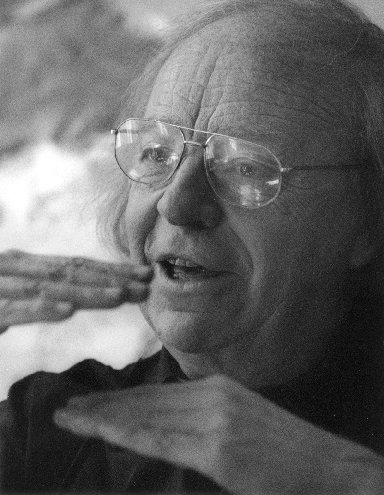 AN:
It must be. A need, a deep need.
AN:
It must be. A need, a deep need.
BD: Do you do any teaching?
AN: [Curtly, as if such an idea were out of the question] No!
BD: Why not?
AN: Well, why not? I don't have to. I live from my music, and I decided not to get out in the practical life. I'm at home receiving telephone calls from the United States. [Both chuckle] It's wonderful.
BD: I just wondered if you didn't feel any responsibility to pass along ideas and techniques.
AN: Oh, well, I think they can read the scores. If they've gone so far, they can read the scores and it's all there. My experience is there.
BD: So your teaching is your legacy.
AN: Yes. It's my work. My work is my teaching. [Both chuckle] Sounds insane!
BD: In your music, is there a balance between an entertainment value and an artistic achievement?
AN: I think the entertainment value will come when people are getting involved in your way of composing. Then I think it's very entertaining. They will laugh and do all these things, but I don't see any distinction between these things. I think if they are taken by the music, at the same time they are amused; they are hit, you know; they are revolted and all this at the same time! And that's good. In those feelings you will probably find a little ray of entertainment. I have nothing against that!
BD: Is composing, for you, fun?
AN: Yes! It's fun, yes. Great fun--and despair. [Pauses for a moment] Fun and despair.
BD: At the same time?
AN: [Fervently] At the same time, yes! You know, that's the one thing which you, the composer, have to live with. All the simultaneous happenings in life are equal to those in the score. As one figuration is running very, very quickly in the score, another one is moving slowly atop in a melody, and a third one is hacking these into pieces of rhythm. So many things go on at the same time! Think of the whole area of the Renaissance, or the High Renaissance, with the 48-part counterpoint. Things like that all happening at the same time! So you can be very overwhelmed at the same time by fun and despair. No problem, I assure you.
BD: [Laughs] Are you optimistic about the future of music?
AN: Yes! I am. Yes. It will float forth and back, you know. We will have people upcoming, now, whose music not only comes from the use of the computer, but also where the computer is a part of the old-time, analog calculation with soft pencil. But now you can do it quicker, to create waveforms in music. Those could be totally by the computer. That is one part, and the other part will go on like nothing has happened. String quartets will continue to be written with soft pencils as if time hasn't passed at all. And the other part will go the other way and probably will create a new wave of electronic music. It hasn't succeeded so far. Not very much electronic music of today goes ahead of the late '50s and early '60s music in Europe. There's hardly any interest in the electronic field. Today I feel that there is a development coming. It's going to be there when they have learned how to master the tool--the eminent philosophical tool--the computer. Because it is a tool, nothing else.
BD: I appreciate your letting me interrupt your day this way. Thank you so much for the conversation, and for all of your music.
AN: Yes. Very good. Now I go for swimming.
=== === === === ===
--- --- ---
=== === === === ===
| Arne Nordheim (born 20 June 1931) is a Norwegian composer, since
1982 living in the Norwegian State's honorary residence, Grotten, next
to the Royal Palace in Oslo. Nordheim has received numerous prizes for
his compositions, and was elected honorary member of the International
Society for Contemporary Music in 1997.
Nordheim's musical output is focused around themes of 'solitude, death, love, and landscape' (Aksnes); these themes are already evident in his song cycle Aftonland (Evening Land, 1959), a setting of poems by the Swedish poet Pär Lagerkvist, which brought him national recognition. The 1961 Canzona per orchestra was his international breakthrough. Inspired by Giovanni Gabrieli's canzone, the work showcases Nordheim's historical leanings, as well as his occupation with space as a parameter of music. Nordheim's spatial concerns, coupled with his focus on death and human suffering, are brought together in what is arguably his most famous work, Epitaffio per orchestra e nastro magnetico (1963). Written in memory of the Norwegian flautist Alf Andersen, who died that year at a very young age, the work incorporated Salvatore Quasimodo's poem Ed è sùbito sera. Originally conceived for orchestra and chorus, Nordheim realised that his wish to have the whole performance space 'singing' was better achieved with the use of electronic means. The result is a remarkable, almost imperceptible, blending of the orchestral sounds with the choral sounds of the tape, where the final line 'ed è sùbito sera' ('and suddenly it is evening') is the only part of the text that can be heard. Later works include The Tempest (1979), Magma (1988), the Violin Concerto (1996) and Fonos for trombone and orchestra (2004). In The Tempest, a ballet based on Shakespeare's play, electronics and orchestral sounds are again mixed, while the focus is more strongly on vocal music (e.g. the 'double voice' of Caliban), while Nordheim's continued use of historical elements is shown by the incorpoation of Leonardo da Vinci's musical rebus, which solved reads Amore sol la mi fa remirare, la sol mi fa sollecita. Norwegian music label Rune Grammofon released a collection of his electronic music work. Draumkvedet is a monumental stage work for orchestra, (acting) chamber choir, soloists and dancers, and was performed 40 times in 1994 with the Broadcasting Corporation Radio Orchestra and Grex Vocalis. On 18 August 2006, Arne Nordheim receieved the honorary doctors degree (doctor honoris causa) at the Norwegian Academy of Music. For more information and photos, visit Nordheim's
Official Website .
|
© 1994 Bruce Duffie
This interview was recorded on the telephone on March 17, 1994. Portions were used (along with recordings) on WNIB in 1996. This transcription was made in 2007 and posted on this website at that time.
Award - winning broadcaster Bruce Duffie was with WNIB, Classical 97 in Chicago from 1975 until its final moment as a classical station in February of 2001. His interviews have also appeared in various magazines and journals since 1980, and he now continues his broadcast series on WNUR-FM, as well as on Contemporary Classical Internet Radio.
You are invited to visit his website
for more information about his work, including selected transcripts of
other interviews, plus a full list of his guests. He would also like
to call your attention to the photos and information about his
grandfather, who was a pioneer in the automotive field more than a
century ago. You may also send him E-Mail
with comments, questions and suggestions.